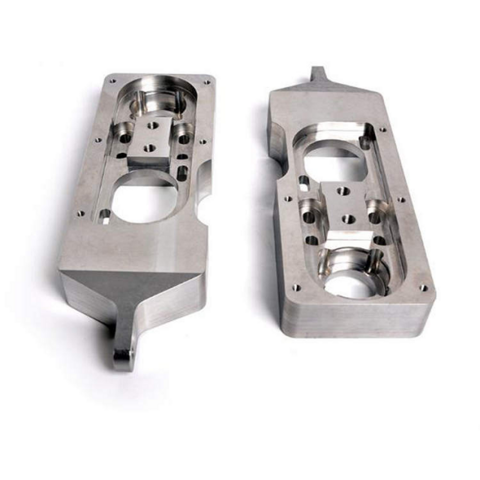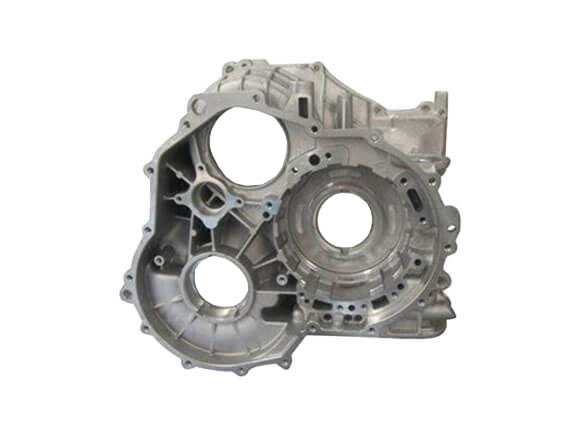Boost your production efficiency through high-performance Precision aluminum casting
Wiki Article
Just How Light Weight Aluminum Casting Adds To Effective Manufacturing Solutions
Aluminum casting plays a crucial duty in modern manufacturing. Its lightweight nature and deterioration resistance make it a favored selection for numerous markets. Methods such as die spreading and sand casting enable the creation of intricate get rid of very little waste. The combination of automation more improves manufacturing effectiveness. Nonetheless, the ramifications of these improvements prolong beyond simple efficiency. Recognizing the wider influence discloses significant understandings into the future of productionThe Benefits of Light Weight Aluminum in Manufacturing
Various metals are used in production, aluminum stands out due to its distinct residential or commercial properties that boost manufacturing efficiency and item efficiency. Its lightweight nature especially reduces transport expenses and power demands in different applications. Aluminum's superb deterioration resistance warranties durability and sturdiness, decreasing the requirement for constant replacements and upkeep. This metal can be easily formed and formed, enabling for versatile style choices that meet specific industry requirements. Additionally, aluminum shows remarkable thermal and electric conductivity, making it an ideal choice for applications needing reliable heat dissipation and electrical management. The recyclability of light weight aluminum likewise plays a vital function in sustainable production methods, as it can be recycled without shedding its intrinsic residential or commercial properties. On the whole, the benefits of aluminum in producing bring about set you back financial savings, boosted product long life, and a minimized ecological footprint, making it a recommended material in countless industries.Secret Aluminum Spreading Techniques
Aluminum spreading methods are essential for creating top quality components in numerous producing processes. The main approaches include sand spreading, pass away casting, and investment casting. Sand spreading involves creating a mold from sand, which enables big components and complicated shapes. This strategy is often preferred for its cost-effectiveness and convenience. Die spreading, on the various other hand, makes use of high-pressure to inject molten aluminum right into steel mold and mildews, resulting in accurate, consistent parts suitable for high-volume manufacturing. Investment casting uses remarkable surface area finish and elaborate information by using a wax pattern that is disappeared to develop the mold and mildew. Each of these strategies has certain applications and advantages, allowing suppliers to select one of the most appropriate approach based upon factors like manufacturing complexity, volume, and material specs. By understanding these crucial methods, producers can enhance their production performance and ensure the honesty of their aluminum components.Effect On Automotive Industry
As the automotive sector progressively prioritizes lightweight materials to improve gas efficiency and efficiency, light weight aluminum spreading has emerged as an important service. This production process enables car manufacturers to produce intricate components with reduced weight without compromising structural integrity. By utilizing light weight aluminum casting, makers can produce parts such as engine blocks, transmission housings, and suspension elements that are not only lighter but additionally display superb thermal conductivity and deterioration resistance.The adaptability of light weight aluminum spreading techniques enables the manufacturing of complex styles, helping with advancement in automobile aesthetics and capability. As vehicles come to be extra technically advanced, the capability to incorporate functions like innovative safety and security systems and electric drivetrains comes to be crucial.

Aerospace Applications of Aluminum Spreading
Aluminum casting plays a critical role in aerospace applications by making it possible for the manufacturing of light-weight structural components that boost fuel efficiency. Furthermore, the precision of aluminum spreading enables the production of intricate engine components, which are vital for peak efficiency and dependability. This combination of lightweight products and precise engineering placements light weight aluminum spreading as a vital innovation in the aerospace industry.Light-weight Architectural Parts
In the quest for enhanced efficiency and efficiency in aerospace applications, lightweight structural parts have come to be increasingly essential. Aluminum spreading plays an essential duty in this venture, giving producers with the capability to produce parts that are both strong and light-weight. The low density of light weight aluminum enables substantial weight decreases without endangering structural integrity, which is important for airplane performance and fuel efficiency. In enhancement, aluminum castings can be crafted to meet specific layout requirements, making it possible for the development of complex geometries that typical manufacturing methods might struggle to attain. This convenience not just simplifies production processes yet also adds to overall price savings. As the aerospace sector continues to stress sustainability, the demand for lightweight light weight aluminum elements is anticipated to increase, even more progressing technology in manufacturing.Accuracy Engine Parts
Makers significantly count on aluminum casting to generate precision engine components for aerospace applications, driven by the product's special residential or commercial properties. Light weight aluminum's lightweight nature substantially lowers total aircraft weight, boosting gas efficiency and performance. Its exceptional corrosion resistance warranties longevity in rough environments, making it perfect for crucial engine elements. Additionally, light weight aluminum casting enables complex styles and limited resistances, essential for maximizing engine performance and reliability. The spreading process also supports mass manufacturing, making it possible for suppliers to satisfy high demand while keeping quality standards. As aerospace innovation remains to advance, the role of light weight aluminum casting in creating precision engine components will be crucial in accomplishing higher effectiveness and advancement in airplane layout and functionality.Sustainability and Environmental Advantages
The growing emphasis on sustainability in manufacturing has positioned aluminum spreading as a leading option for environmentally mindful production. This process utilizes recycled light weight aluminum, which substantially reduces energy consumption contrasted to main aluminum production. By leveraging scrap metal, suppliers can lower their carbon impact and decrease waste, lining up with global sustainability objectives.Additionally, light weight aluminum spreading produces fewer unsafe discharges, contributing to a cleaner environment. The light-weight nature of light weight aluminum likewise enhances gas effectiveness in transport applications, further advertising green methods.
The toughness and rust resistance of aluminum lead to longer product lifespans, decreasing the need for frequent replacements and saving resources. As sectors increasingly focus on lasting choices, aluminum spreading sticks out as an innovative technique that not only satisfies production demands but additionally sustains environmental stewardship. This commitment to sustainability placements aluminum casting as an essential gamer in the change in the direction of a greener production landscape.
Price Performance in Production
Cost effectiveness is a considerable benefit of aluminum casting, enhancing its sustainability benefits - Aluminum Casting Company. The process of aluminum spreading enables the manufacturing of complicated forms with minimal waste, which is specifically important in an affordable manufacturing atmosphere. Making use of light weight aluminum reduces energy expenses, as it has a lower melting factor compared to various other steels, resulting in lowered power consumption during productionFurthermore, light weight aluminum's light-weight homes add to reduce shipping and managing expenses, better enhancing total price efficiency. The toughness and corrosion resistance of aluminum cast items additionally imply that they require less maintenance and replacement gradually, resulting in long-lasting savings for suppliers.
Innovations in casting modern technologies, such as enhanced mold and mildew designs and automation, have streamlined production procedures, decreasing labor costs and boosting result efficiency. Overall, expense efficiency in aluminum casting plays an read more important function in maximizing production operations and sustaining affordable prices methods.
Future Patterns in Light Weight Aluminum Spreading
The future of light weight aluminum spreading is significantly shaped by developments in automation and sustainable material advancements. Automation modern technologies are anticipated to enhance performance and accuracy in the casting process, while lasting practices intend to minimize environmental effect. With each other, these fads promise to redefine production standards and methods within the aluminum spreading sector.Automation in Light Weight Aluminum Spreading
Accepting automation is changing light weight aluminum spreading procedures, paving the method for enhanced performance and precision. Automated systems simplify production by reducing human intervention, decreasing mistakes, and raising throughput. Technologies such as robot arms and computer system mathematical control (CNC) equipments enable precise and constant shaping of aluminum parts. In addition, wise sensors keep track of numerous specifications in actual time, guaranteeing excellent conditions throughout the casting procedure. This assimilation of automation not only shortens lead times yet also enhances item high quality by keeping tighter tolerances. As producers increasingly embrace these innovative innovations, the aluminum spreading sector is set to experience considerable enhancements in functional effectiveness, cost-effectiveness, and competitiveness in the global market.Sustainable Material Innovations

Regularly Asked Questions
What Sorts Of Aluminum Alloys Are Frequently Used in Casting?
Commonly made use of aluminum alloys in casting include 356, 380, and 413. These alloys are favored for their excellent fluidness, stamina, and rust resistance, making them appropriate for a selection of commercial applications.How Does Light Weight Aluminum Casting Compare to Various Other Steel Casting Methods?
Light weight aluminum casting typically supplies lower weight, superior corrosion resistance, and far better thermal conductivity contrasted to various other metal spreading methods. Additionally, it permits detailed designs and faster production cycles, improving total manufacturing efficiency and efficiency.What Industries Advantage The Majority Of From Light Weight Aluminum Casting?
The auto, aerospace, and electronic devices markets profit most from aluminum casting. These fields utilize its light-weight, corrosion-resistant properties to boost efficiency, minimize fuel usage, and enhance overall item effectiveness, making aluminum casting increasingly indispensable.Exist Specific Layout Limitations With Light Weight Aluminum Spreading?
Yes, light weight aluminum spreading has design limitations, including restrictions on wall surface thickness, complex geometry obstacles, and prospective issues with achieving limited resistances (Precision aluminum casting). These aspects can impact the total strength and functionality of the end productHow Is Quality Assurance Maintained in Aluminum Casting Processes?
Quality assurance in light weight aluminum casting processes is preserved through extensive inspections, adherence to standardized treatments, and making use of innovative innovations. Routine monitoring guarantees dimensional precision, surface area stability, and product consistency throughout manufacturing, promoting total integrity.As the vehicle industry progressively prioritizes light-weight materials to boost fuel efficiency and efficiency, light weight aluminum spreading has arised as an essential option. Aluminum spreading plays a critical role in aerospace applications by allowing the production of light-weight architectural elements that boost fuel performance. Expense performance is a substantial benefit of aluminum casting, complementing its sustainability benefits. Embracing automation is changing aluminum spreading processes, leading the method for boosted effectiveness and accuracy. Recycled aluminum usage has obtained traction, significantly lowering power intake compared to main aluminum manufacturing.
Report this wiki page